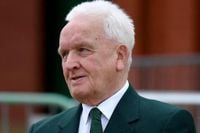John Clark, an iconic figure in Celtic’s storied history and a revered member of the legendary Lisbon Lions, has passed away at the age of 84, the club confirmed on Monday, June 23, 2025. Clark’s death marks the loss of one of the last remaining players from the team that etched its name into football folklore by winning the European Cup in 1967, the first British side to achieve this feat.
Born on March 13, 1941, in Chapelhall near Airdrie in North Lanarkshire, Clark’s journey with Celtic began in 1959 when he made his debut. Over the course of his playing career, he made more than 300 appearances for the club, becoming a bedrock of the team’s defense. Initially starting in the half-back line, Clark was converted into a sweeper under the legendary Jock Stein’s management in 1965, forming a formidable partnership with club captain Billy McNeill. This defensive duo became synonymous with Celtic’s golden era, particularly during the unprecedented quadruple-winning 1966-67 season.
Clark’s finest hour came on that unforgettable day in Lisbon in May 1967, when Celtic triumphed over Inter Milan to secure the European Cup. This victory not only crowned Celtic as champions of Europe but also transformed the club’s legacy forever. Clark was an ever-present figure throughout that season, contributing to Celtic’s haul of six league titles, five League Cups, and three Scottish Cups during his tenure. His contribution to the team’s success was immense, and the Lisbon Lions remain a symbol of Celtic’s proudest achievements.
After leaving Celtic in 1971, Clark’s association with the club was far from over. He returned a few years later to take charge of the youth and reserve teams, nurturing the next generation of Celtic talent. His loyalty and dedication to the club saw him join Billy McNeill once more, serving as his assistant manager first at Aberdeen during the 1977-78 season and then back at Celtic starting in the summer of 1978. Their partnership laid important foundations for future successes, with Aberdeen notably securing key signings such as Steve Archibald and Gordon Strachan during that period.
Clark also carved out a managerial career in his own right during the late 1980s and early 1990s, leading Cowdenbeath, Stranraer, and Clyde. At Clyde, he managed nearly 300 games and was remembered fondly for his leadership and impact. Despite his ventures away from Celtic, Clark’s heart remained with the Hoops, and he returned once again in the 1990s to serve as the club’s kit man, a role he embraced for almost two decades. This humble position underscored his unwavering devotion to Celtic, illustrating a man who valued every facet of the club’s fabric.
Clark’s influence extended beyond the pitch and the dugout. He was known for his warmth, humility, and unassuming nature, qualities that endeared him to teammates, staff, and supporters alike. Veteran broadcaster Hugh Keevins described Clark as an "immortal" figure who was "devoid of ego and devoted to Celtic." His presence at Celtic Park, whether in the stands or behind the scenes, was a constant reminder of the club’s rich heritage.
Tributes poured in from across the footballing world following the announcement of Clark’s passing. Celtic chairman Peter Lawwell described him as “a hero” and “one of the giants” on whose shoulders all subsequent players have stood. “That famous day in Lisbon, which John was such an integral part of, changed our club forever,” Lawwell said. “John gave his life to Celtic both as a player and on our staff in a variety of roles, and his contribution over so many decades is immeasurable.”
Manager Brendan Rodgers echoed these sentiments, calling Clark’s legacy “forever etched in Celtic’s proud history.” Rodgers reflected on the privilege of having Clark’s wisdom and love for the club as an inspiration for players, managers, and staff over the years. “John was instrumental in delivering our greatest day ever,” Rodgers said. “To have him with us for so long was a tremendous privilege. His knowledge and true love for Celtic made a huge impact.”
Celtic chief executive Michael Nicholson also paid heartfelt condolences to Clark’s family, emphasizing the man’s humility despite being one of the club’s greatest. “In a sense, John was Celtic, on and off the pitch across so many years,” Nicholson said. “While John was one of our greatest, his own humility never allowed him to see himself as such.”
Former players and pundits joined in remembrance. Chris Sutton, a former Celtic striker, called Clark “a true Celtic great” and “an absolute gentleman.” John Hartson, another ex-Celtic forward, highlighted Clark’s immense defensive partnership with Billy McNeill. Craig Burley praised Clark as “part of the greatest story in Celtic’s history” and a “friend to all the boys.” Aberdeen and Clyde, clubs where Clark had coaching and managerial roles, also expressed their sorrow, recognizing his respected status in Scottish football.
Clark’s legacy is inseparable from the fabric of Celtic Football Club. His story is one of dedication, loyalty, and excellence, spanning over four decades of service in various capacities. As one of the last living links to the Lisbon Lions, his passing closes a cherished chapter in the club’s history but leaves behind a timeless legacy. The star above Celtic’s crest, symbolizing Lisbon, shines ever brighter in memory of John Clark and his teammates.
As the Celtic family and football community mourn his loss, they also celebrate a life devoted to the beautiful game and a club that meant everything to him. John Clark’s name will forever be spoken with reverence, his contributions remembered with gratitude, and his spirit cherished by all who love Celtic.


